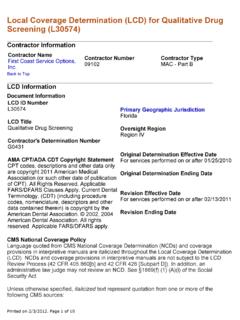Transcription of Medical Necessity Determinations in the Medicare …
1 1 Medical Necessity Determinations in the Medicare Program: Are the Interests of Beneficiaries With Chronic Conditions Being Met? Vicki Gottlich, , Center for Medicare Advocacy, Inc. Washington, Prepared for Partnership for Solutions: Better Lives for People with Chronic Conditions A project of the Johns Hopkins University and the Robert Wood Johnson Foundation January 2003 2 PREFACE This paper, Medical Necessity determination in the Medicare Program: Are the Interests of Beneficiaries With Chronic Conditions Being Met?, was commissioned by the Partnership for Solutions: Better Lives for People with Chronic Conditions, a project of the Johns Hopkins University and the Robert Wood Johnson Foundation. The author would like to thank Dr.
2 Robert Berenson, Dr. Linda Bergthold, Susan Foote, Leslie Fried, Jane Horvath, Tom Hoyer, Judith Stein, and Robert Streimer for their thoughtful review of the paper and their helpful comments. 3 EXECUTIVE SUMMARY Of the nearly 40 million Medicare beneficiaries, over three-quarters (78%) have at least one chronic condition which requires ongoing Medical care and management. Almost two-thirds (63%) have two or more chronic conditions, and twenty percent of Medicare beneficiaries have five or more chronic conditions. Thus, access to Medical services that addresses the needs of people with chronic conditions is critical for the majority of Medicare beneficiaries. Medicare confers on its beneficiaries entitlement to broad categories of Medical services. The program has developed a myriad of rules specifying particular Medical items and services for which the program will or will not make payment, either for all beneficiaries or for beneficiaries in specific circumstances.
3 Most of these rules are not found in the Medicare statute and regulations. They are set out in program manuals and National Coverage Determinations developed by the Centers for Medicare & Medicaid Services (CMS), the agency that administers Medicare , or in local coverage policies, called Local Medical Review Policies (LMRPs) developed by CMS local contractors. Where the Medicare statute is silent, an NCD may be developed to state, on a national basis, whether Medicare will cover a particular item or service, and the population for whom it may be covered. If no NCD has been issued, or an NCD requires further clarification, an LMRP may be developed to determine initial Medicare coverage for an item or service, or to determine Medical Necessity in an individual claim.
4 An LMRP may also serve as a program integrity tool to prevent inappropriate payment of Medicare funds. Medicare standards for making Medical Necessity Determinations in individual cases do not always address the particular needs of beneficiaries with chronic conditions. Chronic care differs from acute care, where the treatment goal is improvement and/or cure, and end of life care, where the treatment goal may be palliation. The goal for a patient with chronic conditions may be to prevent deterioration and/or to maintain functioning. A patient with one or more chronic conditions may have a Medical need for, and accepted Medical and nursing practice may require, observation and assessment, therapeutic care, and care management on an on-going basis. Nevertheless, for certain services, such as outpatient therapy services, Medicare s policies impose improvement standards that are inconsistent with the statute.
5 The Medicare statute does not demand a showing of improvement to find services medically necessary or to cover treatment of an illness or injury. The statutory criterion for treatment of an illness or injury applies regardless of where the covered service is provided, be it in a skilled nursing facility, at home, or as an outpatient. Even when Medicare rules currently address the treatment requirements of beneficiaries with chronic conditions, those rules and the language of the statute are not always followed. For example, Medicare regulations and policy manuals governing skilled nursing facility and home health care acknowledge that services may be required to maintain ability or prevent deterioration. Despite the clarity of the regulations, Medicare providers and contractors sometimes impose an improvement standard and deny care when the beneficiary s condition is stable or when maintenance services are needed.
6 4 Medicare policies concerning Medical Necessity Determinations in individual claims should be revised to recognize that the overwhelming majority of beneficiaries have at least one chronic condition whose method of treatment and treatment goal are different from the method of treatment and treatment goal for an acute illness or injury. In this regard: Improvement should not be a Medical Necessity criterion used to determine a patient s claim unless the service at issue relates to a malformed body member. Maintenance of ability, prevention of deterioration, and patient education should be recognized as treatment goals for beneficiaries with chronic conditions. Beneficiaries with multiple chronic conditions should be allowed to demonstrate a need for ongoing services in order to obtain more services or services for a longer period of time than set forth in local policies.
7 The Medical Necessity analysis should not be dependent upon payment policies. To accomplish these goals, Medicare manuals and other policies need to be reviewed to assure that they meet the above criteria and that they do not conflict with the Medicare statute and regulations. Agency policies also need to be reviewed on a regular basis to assure that they comport with changes in Medical knowledge and practice. CMS is beginning to review local policies and to establish procedures to assure that they are consistent with current Medical practice and knowledge as well as with agency regulations and guidance. CMS plans to improve beneficiary notices to include information about why a claim was denied.
8 The agency also plans to establish a data system that allows it to track the reasons for a claims denial so that the agency can identify and address problem areas. The Medicare statute provides coverage for an array of services to address many of the needs of beneficiaries with multiple chronic conditions. The services are available as long as they are reasonable and necessary for the diagnosis or treatment of the particular beneficiary s individual illness or injury. CMS needs to assure that the statute is interpreted properly so that Medicare beneficiaries with chronic conditions are able to obtain the Medical care they require. 5 I. INTRODUCTION Medicare is a federal program which provides health insurance to people age 65 and older who are eligible for social security benefits, people younger than age 65 who have received social security disability benefits for twenty-four months, people with end-stage renal disease (ESRD) and ALS.
9 Of the nearly 40 million Medicare beneficiaries, over three-quarters (78%) have at least one chronic condition which requires ongoing Medical care and management. Almost two-thirds (63%) have two or more chronic conditions, and twenty percent of Medicare beneficiaries have five or more chronic Thus, access to Medical services that address the needs of people with chronic conditions is critical for the majority of Medicare beneficiaries. The Medicare program itself has a strong interest in the care provided to people with chronic conditions, since the program expends more funds per beneficiary as the number of chronic conditions increases. The Standard Analytic File (SAF), Centers for Medicare & Medicaid Services, 1999, indicates that the average per person cost to Medicare , taking into account all beneficiaries regardless of age and eligibility category, was $4,200.
10 Average costs per beneficiary ranged from $160 for beneficiaries without chronic conditions, to $13,700 for beneficiaries with five or more chronic conditions. Medicare expends 66% of its funds on the latter group, who comprise 20% of Medicare The Medicare statute, 42 1395 et. seq., confers on its beneficiaries entitlement to a broad range of specific Medical services. Medicare Part A, hospital insurance, provides coverage for in-patient hospital services, skilled nursing facility services, some home health care, and hospice services. Part B, ".. the voluntary supplemental plan ..provide[s] protection that builds upon the protection provided by the hospital insurance plan. It cover[s] physicians' services, additional home health visits, and a variety of other health services, not covered under the hospital insurance plan.









